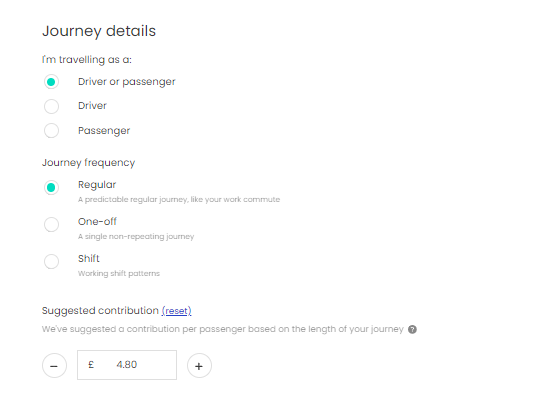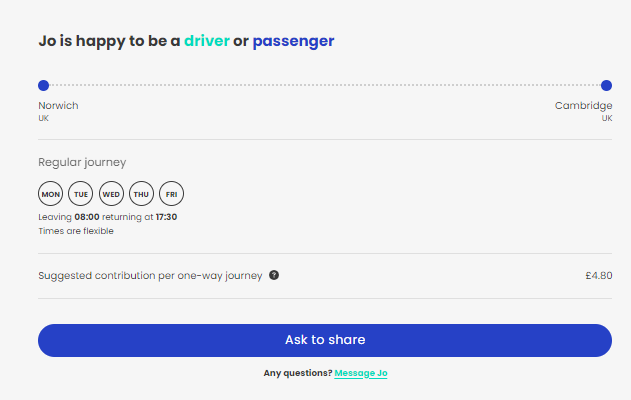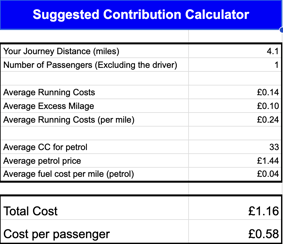This guide provides comprehensive information on how we calculate the suggested contribution, the principles behind it, and its legal implications.
What is the Suggested Contribution?
Liftshare's suggested contribution is our recommended amount that passengers should contribute to the driver for sharing a ride. It’s designed to ensure that the driver's costs are fairly covered, without making a profit.
This is important as overcharging might be viewed as profiting from carsharing, which could invalidate a driver’s insurance.
It's essential to note that suggested contribution proposed by Liftshare when adding a journey is merely a guideline. The actual amount a passenger pays should be a mutual decision between the passenger and the driver.
How is the suggested contribution displayed?
The suggested contribution appears on the driver's journey details as a scale from £0 (in case the driver wishes to offer a lift for free) to the maximum amount that should be requested so the driver doesn't make a profit. The amount can be changed down using the minus button and up (as far as the capped limit) using the plus button.

The amount the driver sets is then shown to potential passengers in their journey details. This can be found by clicking on any of the journey results shown when you find matches.
How We Calculate Suggested Contribution:
Navigating shared journey costs can be tricky, and at Liftshare, our commitment is to simplify this process. Let's dive into the elements that make up the suggested contribution calculation:
1. Running & Maintenance Costs: This includes expenses such as servicing, tyre replacements, and general maintenance. We rely on the latest industry standards to obtain an average cost per mile.
2. Fuel Costs: With fluctuating market prices for fuel, we ensure our calculations stay up-to-date. This helps us determine the monetary expense for the fuel a vehicle consumes per mile.
3. Miles per Gallon (MPG): Different vehicles have varying fuel efficiencies. Using the average MPG, we assess how much fuel a typical car will consume on the journey.
4. Journey Length: The distance of the trip, of course, plays a pivotal role. Longer journeys will invariably have a higher cost associated.
5. Shared Costs: We then divide the total cost by the number of occupants (including the driver). This gives a fair distribution of expenses.
Armed with these factors, we provide a suggested contribution for each journey.
Assumptions as of August 2023
When calculating the suggested contribution, it's essential to note the foundational assumptions that our model uses. These include:
- Running & Maintenance Costs: An average of 14p per mile.
- Fuel Costs: An average fuel price of 144.45 p/litre.
- Miles per Gallon (MPG): The average UK car drives 38.8 miles to the gallon.
- Journey Length: This is based specifically on the distance between the start and end points of the driver's journey.
- Journey Type: Our suggested contribution is based on a single journey travelling one-way.
- Shared Costs (Number of Passengers): We base our calculations on the assumption you'll be sharing the journey costs with one other passenger.
Remember, these are averages and estimates. Every journey is unique, and so are its costs and variables.
Example of Suggested Contribution for a 4.1-mile Journey
We'll use a 4.1-mile journey to illustrate how each component of our model contributes to the final suggested amount.
- Running & Maintenance Costs: At an average of £0.14 per mile, a 4.1-mile journey would cost £0.574.
- Fuel Costs: Assuming a fuel price of 144.45 p/litre and an average consumption rate of 38.8 miles per gallon:
- Fuel needed for 4.1 miles = (4.1 miles / 38.8 mpg) = 0.1057 gallons = 0.481 liters.
- Cost = 0.481 liters x 144.45 p/litre = 69.52p or £0.6952.
- Total Cost for the Journey: Running & Maintenance + Fuel Cost = £0.574 + £0.6952 = £1.2692.
- Shared Cost (Assuming 2 participants - 1 driver and 1 passenger): £1.2692 ÷ 2 = £0.6346 or 63.46p.
For a 4.1-mile journey, the Suggested Contribution, when shared between a driver and one passenger, would be approximately 63.46p.
Explore Our Assumptions with Our Simple Calculator
We've crafted a simple calculator for you to dive in and tailor them to your journey, to find out what the Suggested Contribution would be:
Legal Implications:
1. No Profits Allowed: The main principle behind suggested contributions is to ensure that the driver is not making a profit. This not only maintains the spirit of carpooling but is also vital for legal and insurance reasons.
2. HM Revenue and Customs (HMRC): Our calculation is aligned with HMRC's approved mileage payment allowance. This ensures that drivers are not inadvertently earning income that needs to be declared for tax purposes.
3. Insurance: Overcharging might be viewed as profiting from carsharing, which could invalidate a driver’s insurance. Our suggested contribution helps avoid this pitfall.
ULTRA LOW EMISSION ZONE (ULEZ) and Suggested Contributions
What is ULEZ:
The Ultra Low Emission Zone (ULEZ) in London means only vehicles meeting certain emission standards are allowed to travel without paying a charge. ULEZ was introduced to help improve air quality by restricting or discouraging the use of older, more polluting vehicles in congestion areas.
On Liftshare we show the ULEZ zone on a map, so you can see if your journey goes through it and there could be a charge, or if there are any alternative routes. The driver should check whether there is a ULEZ charge for their vehicle on the TFL website. If their vehicle is ULEZ-compliant, they can mark it as such on Liftshare, to show potential passengers they are not liable for a ULEZ charge.
How ULEZ Impacts Liftshare's Suggested Contributions:
-
No Direct Inclusion: As of now, Liftshare's Suggested Contribution does not factor in the ULEZ charge. Our calculation is primarily based on running & maintenance costs, fuel costs, miles per gallon, journey length, and shared costs.
-
Reason for Exclusion: The ULEZ charge is specific to London. It's not a universal charge and doesn't apply to all journeys. As such, to keep our suggested contributions straightforward and universally applicable, we've chosen not to include the ULEZ charge in our standard calculations.
-
Driver-Passenger Discussion: If a driver's route goes through a ULEZ and they are liable for a charge, it's recommended that they discuss this with potential passengers. The driver and passengers can agree to include part or all of the ULEZ charge in their agreed contribution if they deem it fair.
In Conclusion:
Liftshare's suggested contribution system is designed to benefit both drivers and passengers, by ensuring that the costs are transparent and don't lead to car insurance being invalidated.
Remember, the suggested contribution is precisely that – a suggestion. It's a starting point for negotiations between the driver and passenger, and we provide a range to ensure flexibility.
Got more questions? We're here
If you have any other questions, why not raise a ticket and someone from our team will be able to help.
Travel Happy
Your Liftshare Team

